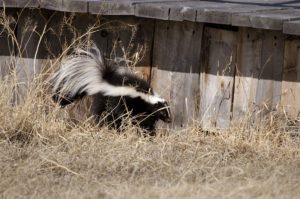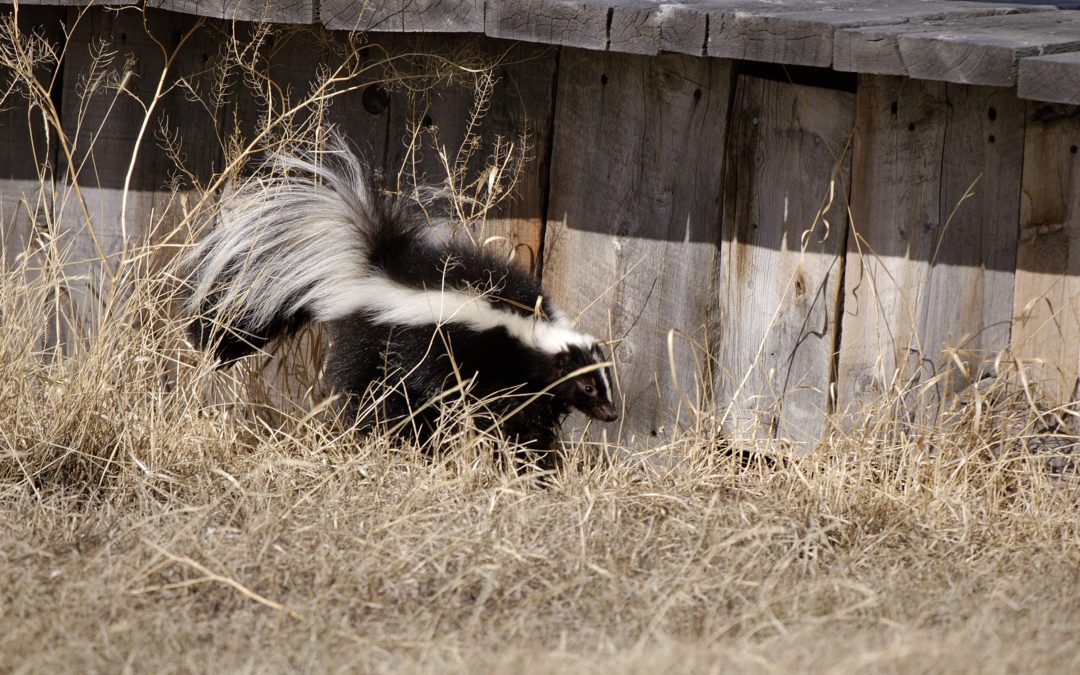
What have skunks been doing all winter?
You may think they’re not around during the winter, but skunks den in the same kinds of places when it’s cold as they do when it’s warm. They just don’t venture out as often. Skunks don’t go into full hibernation in the winter, but they do enter into a state of dormancy called torpor. Torpor means that an animal’s core body temperature and metabolism will decrease to conserve energy over a period of time. Some animals like bats and birds will undergo daily torpor, which means that they’ll become inactive for a portion of each day. Some animals will undergo seasonal torpor to help them survive colder months. Skunks are in the latter group. And before you say, “That sure sounds like hibernation to me,” hibernation is actually a form of torpor. So all hibernation is torpor, but not all torpor is hibernation. Got it? Good. Now you too can sound like a smartypants at dinner parties.
It’s only February. Isn’t it still too cold for skunks to mate?
Nope! Skunks typically mate in February and March and give birth in May and June. We’re entering the part of the season where temperature is a little unpredictable, so a warm day here and there is enough to jumpstart a skunk’s desire to reproduce. It’s also enough to thaw the ground. Wet, soft dirt makes it much easier for skunks to dig for grubs and worms. A male skunk is looking to impregnate as many females as possible, so he’ll spray to let other males know that they better not trespass on his territory. Pregnant females will dig out burrows where they can give birth and raise their young, and they’re likely to spray near their dens to mark their territory and scare off predators. Also, fun fact: you’re most likely to smell skunk early in the morning or around sunset. Skunks are (get ready for another vocabulary word!) crepuscular, meaning their peak times of activity are dawn and dusk. If you want to keep your dog from getting sprayed, I recommend keeping them inside during twilight hours.
Skunks smell is awful. Who can I call for skunk removal?
There isn’t really anything that can be done to stop skunks from mating. Birds do it, bees do it, and unfortunately skunks to it too. But ABC Wildlife can definitely help to remove them and keep them from mating and denning on your property. If you’re experiencing a very strong, persistent skunk smell and suspect they might be living under your house, deck, porch, or shed, call ABC Wildlife to schedule an appointment with one of our skunk removal experts. Our technicians handle skunks on a daily basis and are very experienced at locating the places where skunks are most likely to den. ABC Wildlife also offers animal proofing services like screen-ups that will prevent skunks from being able to dig under the structures on your property. You can depend on us for all of your skunk removal and exclusion needs. Call us today at (847) 870-7175 to speak with one of our state-licensed representatives.
Sharing is caring! If you’ve learned something from what you’ve read, please click one of the icons below to share this post on social media.
Karen Jesse is a wildlife writer and educator licensed by the Illinois Department of Natural Resources and the Illinois Department of Public Health in urban wildlife management and structural pest control. She enjoys hiking, telling people how cool skunks are, and opera.



